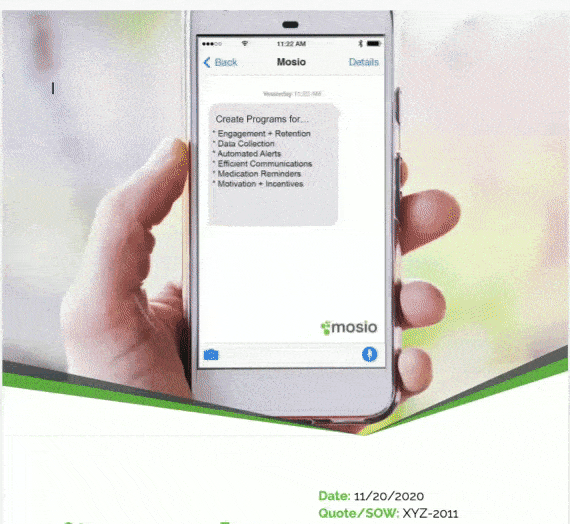Automated communication can play a pivotal role in helping clinical research coordinators and administrators successfully execute the responsibilities of their roles.
Back-and-forth communication with study participants is a large part of a clinical research coordinator’s job. From information participants about study objectives to administering questionnaires, there is a countless number of seemingly small tasks that amount to a hefty workload for clinical research coordinators to juggle. Nobody knows how to handle a full plate quite like a clinical research coordinator, but that doesn’t mean this is sustainable.
One of the most common complaints from coordinators is that they spend too much time playing telephone tag with participants. When they are responsible for dozens of study participants, this can quickly eat away at the time they have to complete other important tasks.
This is where text messaging comes in.
An automated text messaging solution can take the weight off of a coordinator’s shoulders by handling all of the back-and-forth communication with participants. With this type of solution, coordinators can create and schedule timely messages in advance. This is about de-cluttering the calendars of coordinators and project managers and giving them the time they need to double down on high-value tasks.
How Automated Text Messaging Empowers Clinical Research Staff
Overseeing the smooth running of clinical research trials
The work of clinical research coordinators is essential to the success of these trials, but they can often feel bogged down by all of the little tasks that need to be completed on a daily basis. An automated text messaging solution can take on the burden of back-and-forth communication with participants, freeing up coordinators to focus on other high-value tasks.
Automated text messaging can also help to streamline other important research team tasks, such as managing participant scheduling and reminders, collecting data, and following up with participants after a trial has ended.
Collecting study data from research participants
Clinical research coordinators are responsible for collecting a variety of data points from participants throughout the course of a trial. This data can be collected in person, over the phone, or through surveys and questionnaires. Using an automated text messaging solution, you can send questions to participants – which they can answer in their own time.
This means you do not need to wait over the phone for their answers or coordinate a time to meet in person. Not only does this save time, but it also allows participants to answer questions in a way that is convenient for them.
By having all communication in a single location, you are centralizing data collection and making it easier to track responses. This is valuable not only for the coordinator, but also for the entire research team as it allows them to have a clear overview of progress at any given time.
Informing participants about clinical study objectives
From the outset, you can set the tone with communication by sending participants a message about the objectives of the trial. You can use this message to explain the purpose of the study, what is expected of them, and how their participation will contribute to the advancement of medical knowledge.
It is important that participants have a clear understanding of these objectives from the start, as it sets the stage for a successful trial. By sending this information via text message, you can be sure that participants will receive it in a format that is convenient for them and that they can refer back to at any time.
Individually communicating this information is time-consuming and leaves room for error. To ensure everyone is on the same page, it’s better to send a mass text message to all participants at once. This is a simple, yet effective way to keep everyone informed and up-to-date on the latest trial information.
Administering questionnaires to study participants
Questionnaires are a common data-gathering tool used in clinical research. They help to gather information about participants’ symptoms, experiences, and views on the trial itself.
Traditionally, questionnaires have been administered in person or over the phone. This isn’t scalable – and ultimately leaves coordinators swamped with work. A better solution is to send questionnaires via text message.
Let’s face it, most people have their phone within arm’s reach at all times – so there’s no need to wait for participants to be available to administer a questionnaire. Sending questionnaires out via text message is likely to improve response times and study engagement more broadly.
Monitoring participants to ensure adherence to rules
Clinical research trials have a lot of rules and regulations that participants must adhere to. It is the responsibility of the clinical research team to ensure that participants are following these rules and regulations.
Without discipline, the accuracy of your study data is thrown into question. Using an automated text messaging solution, you can send messages to all study participants at exactly the same time. When issues arise, you can get all participants on the same page in a heartbeat.
No scurrying around trying to track down participants. No waiting for days or weeks for a response.
This is an efficient way to ensure that everyone is up-to-speed with the latest information and is equipped to comply with all rules.
Adhering to research regulatory and ethical standards
When it comes to record-keeping, a single thread of communication with each participant is immensely valuable. You can use this communication thread to adhere to regulatory and ethical standards by documenting all interactions with participants.
Engaging with subjects and addressing their queries
In any clinical research trial, there will always be some participants who have questions or need clarification on certain aspects of the study. With automated text messaging solutions, you can create a list of frequently asked questions (FAQs) that participants can refer to at any time.
This is a quick and easy way to address common queries without having to individually respond to each one. It also helps to keep the lines of communication open so that participants feel comfortable raising any concerns they may have.
Automated Text Messaging For Clinical Research Teams (Getting Started)
Mosio is automated text messaging software for clinical research teams. Learn more about how you can automate your study communications for better adherence, engagement and data collection with Mosio.







